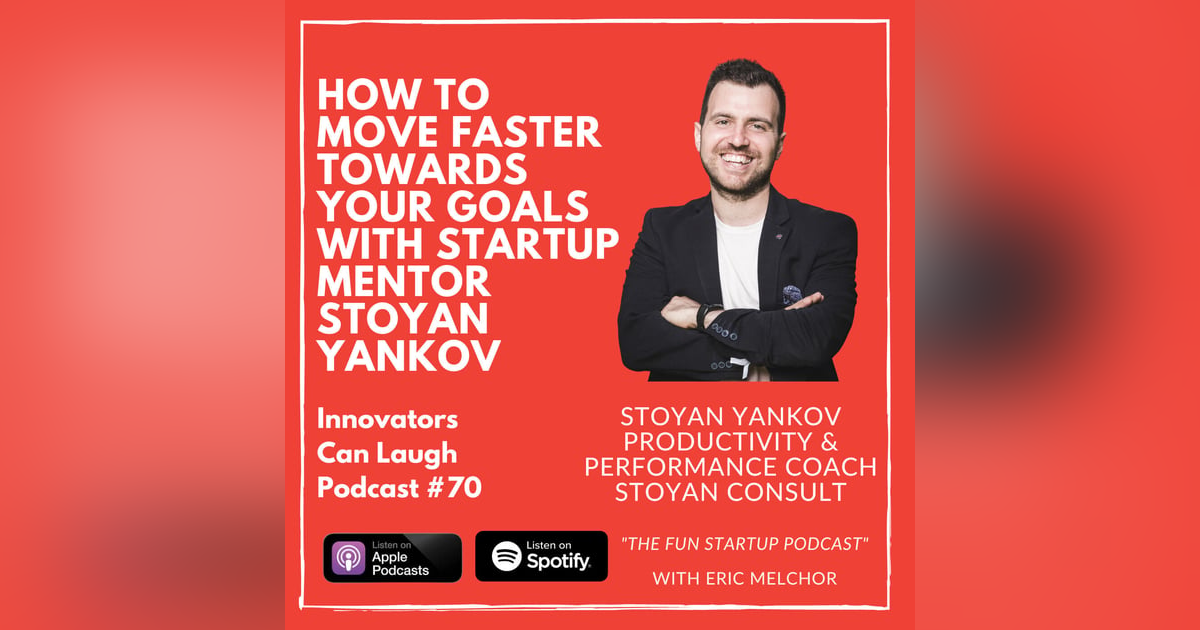How to move faster towards your Goals with Startup Mentor Stoyan Yankov

Imagine you are the main character of your own movie. But not just the main actor. You’re also the producer and director of this movie. Close your eyes and visualize how you would tell this story.
Will it be filled with adventure and suspense?
Would your story be uplifting or depressing?
Would your story have the power to change lives?
This is the power that Stoyan Yankov instills in others. A master coach, speaker, and author (co-wrote Perform: The Unsexy Truth about Startup Success with Cristobal Alonso from Startup Wise Guys), Stoyan shares his journey of becoming a startup mentor. If you feel like you’re not moving as fast toward your goals like you could be or want to know more about instilling a great company culture, this is the episode for you!
Do you wish to connect with our special guest?
Visit Yasen’s website: www.stoyanyankov.com
Tune in to every conversation about exciting European Startups and Innovators on Apple Podcasts, Spotify, and Amazon! Leave a rating and review so we can keep making amazing interviews!
Listening on a desktop & can’t see the links? Just search for Innovators Can Laugh in your favorite podcast player.
Connect with Eric:
Visit his website: https://innovatorscanlaugh.com
For the Innovators Can Laugh newsletter in your inbox every week, subscribe at https://innovatorscanlaugh.substack.com
Past Guests:
----
Past guests on Innovators Can Laugh include Yannik Veys, Ovi Negrean, Arnaud Belinga, Csaba Zajdó, Dagobert Renouf, Andrei Zinkevich, Viktorija Cijunskyte, Lukas Kaminskis, Pija Indriunaite, Monika Paule, PhD, Vytautas Zabulis, Leon van der Laan, Ieva Vaitkevičiūtė.
-----
Additional episodes you might enjoy:
#55 Yannik Veys - From creating the Uber for service professionals to growing Hypefury
#53 Tzvete Doncheva - Overcoming barriers to get into a VC with Tzvete Doncheva
Tune in to every conversation about exciting European Startups and Innovators on Apple Podcasts, Spotify, and Amazon! Leave a rating and review so we can keep making amazing interviews!
Listening on a desktop & can’t see the links? Just search for Innovators Can Laugh in your favorite podcast player.
Connect with Eric:
Visit his website: https://innovatorscanlaugh.com
For the Innovators Can Laugh newsletter in your inbox every week, subscribe at https://innovatorscanlaugh.substack.com
Past Guests:
----
Past guests on Innovators Can Laugh include Yannik Veys, Ovi Negrean, Arnaud Belinga, Csaba Zajdó, Dagobert Renouf, Andrei Zinkevich, Viktorija Cijunskyte, Lukas Kaminskis, Pija Indriunaite, Monika Paule, PhD, Vytautas Zabulis, Leon van der Laan, Ieva Vaitkevičiūtė.
-----
Additional episodes you might enjoy:
#55 Yannik Veys - From creating the Uber for service professionals to growing Hypefury
#53 Tzvete Doncheva - Overcoming barriers to get into a VC with Tzvete Doncheva
#50 V...











